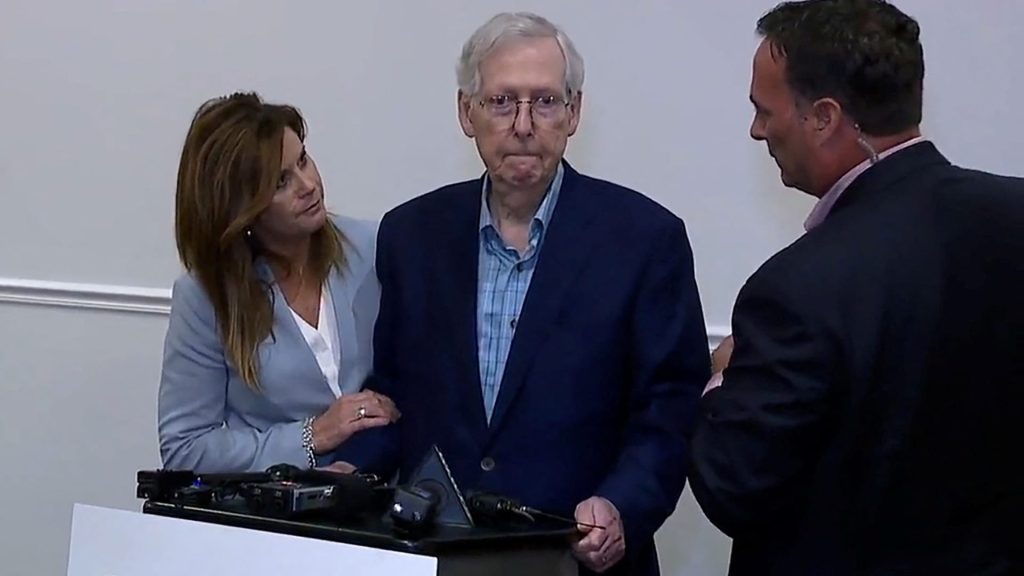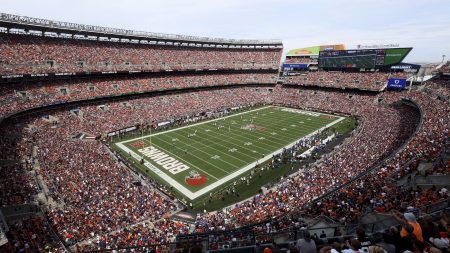Senate Minority Leader Mitch McConnell, R-Ky., on Wednesday appeared briefly unable to respond to reporters’ questions at a press event, marking the second time in weeks that the Republican leader has abruptly stopped speaking and required help from people around him.
McConnell, 81, initially seemed to struggle to hear when asked at an event in Covington, Kentucky, about his views on running for reelection.
But the senator then froze at the lectern and did not speak for about 30 seconds. He did not appear to immediately respond when a member of his staff approached him to ask if he had heard the question.
“All right, I’m sorry, you all. We’re going to need a minute,” the aide said during that interval.
McConnell then appeared to signal he was ready to receive another question. He was asked about Kentucky’s Republican attorney general, Daniel Cameron, who is running for governor.
After his aide loudly repeated the question into his ear, McConnell said, “I think the governor’s race is going to be very close,” with his voice lowering in volume as he finished his reply.
He brushed off a final question about former President Donald Trump’s latest indictment in Georgia before being led away from the lectern.
McConnell suffered a similar episode July 26 in Washington, D.C., where he froze and was briefly unable to speak at a news conference.
In that case, McConnell’s fellow senators rushed in to help him, and after a few minutes he returned to the lectern and continued speaking to reporters.
At the time, McConnell dismissed questions about whether the health scare was in any way connected to a concussion he suffered earlier this year when he fell at a political fundraiser.
A spokesman for McConnell said in a statement Wednesday that the Senate leader “felt momentarily lightheaded and paused during his press conference today,” NBC News reported.
An aide to McConnell added that while the senator “feels fine, as a prudential measure, the Leader will be consulting a physician prior to his next event,” per NBC.
Fresh questions about McConnell’s health arise at an especially fraught moment for Republicans in Congress, who hold a narrow majority in the House and 49 seats in the Senate.
On Tuesday, Republican House Majority Leader Steve Scalise announced that he had been diagnosed with multiple myeloma, a rare blood cancer. The 57-year-old Louisiana lawmaker called the disease “very treatable” and promised he would return to Washington, though he did not say precisely when.
Congress is scheduled to return to session in September after a monthlong recess, with the Senate back in session Sept. 5 and the House on Sept. 12.
President Joe Biden, asked about McConnell during a briefing Wednesday afternoon on the severe weather threatening the U.S. southeast, said he would reach out to the senator.
“We have disagreements politically, but he’s a good friend,” Biden said. “And so I’m going to try to get in touch with him later this afternoon.”
Biden had wished McConnell well after his fall in March, and the senator said the president had called him up following his verbal freeze in July. “I told him I got sandbagged,” McConnell said he told the president at that time.
Republicans are not the only ones fielding concerns about their health and fitness to serve in Congress. With a median age of 59 years old, the House and Senate are older today than at any point in modern history.
Sen. Dianne Feinstein of California, who at 90 is the oldest member of either party In Congress, has come under immense bipartisan scrutiny for continuing to hold her Senate seat despite a series of debilitating health issues.
Feinstein was away from Washington for three months earlier this year while she recovered from shingles, leaving Democrats down a vote in the Senate, where members are not permitted to cast votes in absentia.
The Democratic lawmaker was briefly hospitalized earlier this month after a minor fall in her home.
Read the full article here











